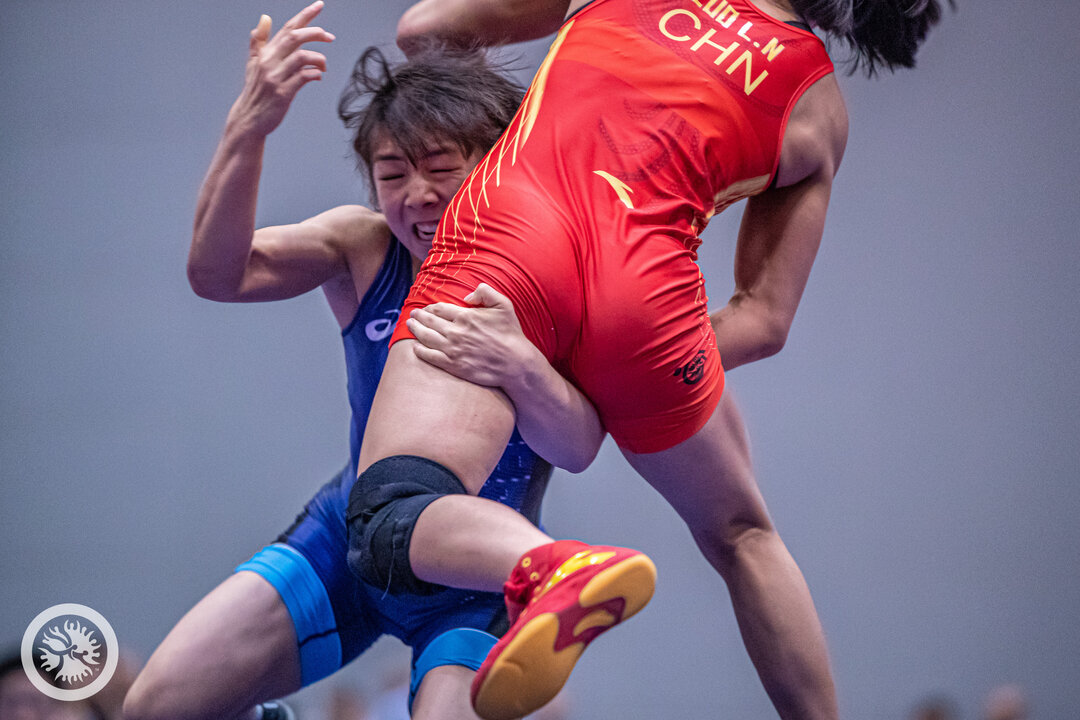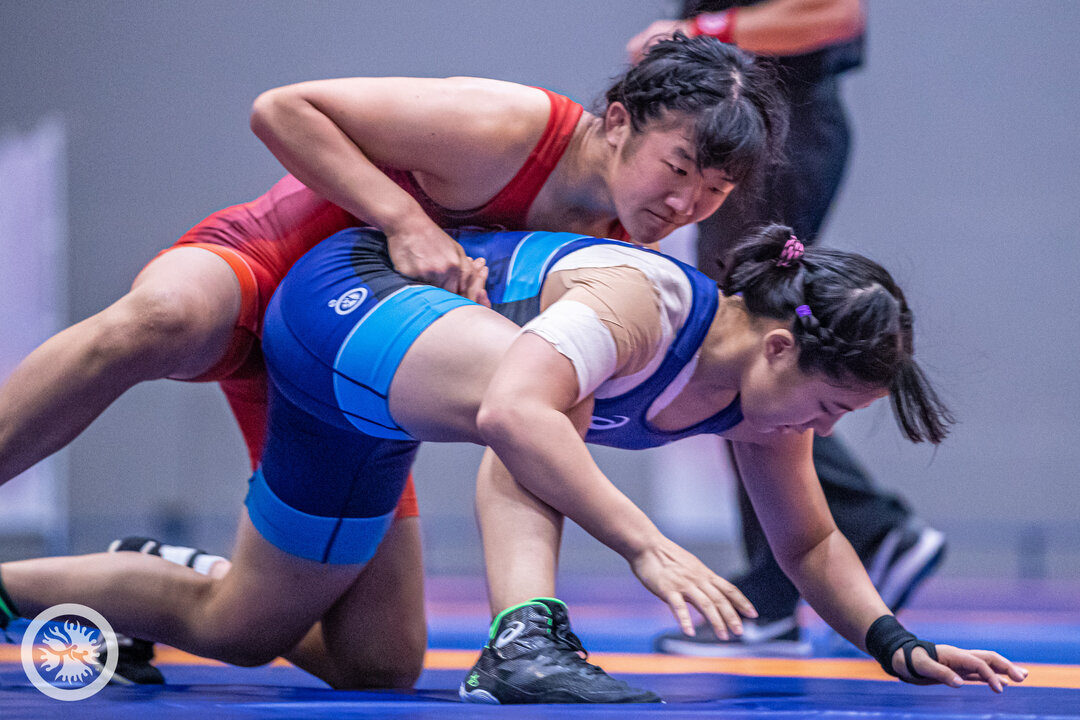With Kyrgyzstan Watching, Tynybekova Ready to Conquer Tokyo
Monday, August 2, 2021 - 23:13 By Vinay Siwach

CHIBA, Japan (August 3) --- When Aisuluu TYNYBEKOVA (KGZ) steps on the mat Tuesday at the Makuhari Messe Hall in Chiba, Japan, the whole of Kyrgyzstan will be watching her quest for a historic medal at Olympics.
No Kyrgyzstan wrestler has ever won a medal in women's wrestling at the Olympics. Forget that, no other woman had qualified for Olympics other than Tynybekova before Tokyo. Five years ago, she came agonizingly close to winning a medal in Rio Olympics but lost the bronze medal bout against Sakshi MALIK (IND) in the final seven seconds.
But in Tokyo, she is expected to win the gold medal. Such has been her aura in the last Olympic cycle that she is considered the best, is seeded top and has wins over almost all her opponents.
"We have been going at this for a very long time," Tynybekova was quoted as saying in a January 2020 interview with Sputnik. "I have already participated in two Olympic Games -- in London and Rio de Janeiro. I didn't manage to win medals in them because of my mistakes. The only thing missing from my piggy bank is an Olympic medal. I want not just a medal, but a gold one."
On Tuesday, she begins her campaign with a rematch of the Individual World Cup 2020 final against veteran Anastasija GRIGORJEVA (LAT) and a win will give her the winner of the Marianna SASTIN (HUN) and Kriszta INCZE (ROU) bout in the quarterfinal.
But she wants to make it to the final and a step closer to history, she will have to go through one of Aminat ADENIYI (NGR), Iryna KOLIADENKO (UKR), LONG Jia (CHN) and Kayla MIRACLE (USA). Last year, Long ran her close and Tynybekova was able to pull off a 6-6 criteria win in Rome, Italy.
"Since Kyrgyzstan gained independence, we have not had a gold medal in Olympic sports," Tynybekova said. "I want to make history by winning a gold at the Olympic Games."
She did not have those dreams a kid. The 29-year-old did not even know about wrestling till was 16 years old.

Born in Mailuu-Suu in the Jalal-Abad oblast of Kyrgyzstan. Tynybekova helped her parents at home and in the farm but was part was always finding a way to play sport.
That led her to basketball but when she discovered a wrestling program has begun in Bishkek, she left home to train in the new sport. Despite the reservations from her family, Tynybekova was sure that she wanted to do this.
She became so good at wrestling in such a short time that in 2012, she qualified for the London Olympics, the first woman wrestler from her country. Unfortunately, she failed to advance after her opening round loss.
But it sowed the seeds of a women's wrestling in the country. National team head coach Nurbek Izabekov has been trying to lift the standard of women's wrestling in Kyrgyzstan for close to two decades now. But when Tynybekova qualified for the Olympics in London, it worked as a catalyst.
Work began to prepare Tynynbekova to become the first Olympic medalist from her country. She claimed silver medals at the Asian Championships, bronze medal at the Asian Games but by the time Olympics came, she became Kyrgyzstan's first Asian champion in women's wrestling.
That fueled the ambition of winning a medal in Rio. But it was a heartbreak and left Tynybekova battling depression.
“After the 2016 Games, I had been in a long depression,” she says. “I couldn’t get over it for a long time. I had been analyzing a lot, I had been thinking a lot. I didn’t show tears in front of people, but after the loss I was ready to cry. I couldn't face my coach, who hadn't been home with his family for months to prepare me. Everything was burning inside me, and I was ready to sink. After returning to the village, I went into the room and cried alone.”
No one knew how to cheer her up. But it was the passion for wrestling and a unique gesture from the public in Kyrgyzstan that made her return to the mat. Using the loss in Rio as a motivation, she decided to train again and leave nothing to fate.
“My sister sent me a post and comments that Kyrgyzstanis wrote to me,” she says. “She said that I united the Kyrgyz people, that this had never happened before, that everyone supported me as a native.”
The loss in Rio made Tynybekova a mature wrestler and human being. Her style of forcing an attack changed to tactical wrestling of playing the clock. She even manages to pull of the last second takedowns which make her dangerous. Just like on that in 2019.
Tynybekova ran through a strong field to claim the world title in Nursultan, Kazakhstan. That too was the first time a wrestler, male or female, from the central Asian country had won the gold.
That lifted her to celebrity status in the country. Gifts were showed, film crews rushed to her village to get some footage of the childhood, she was on every TV channel. But missing out the medal in Olympic always remained a thorn in her heart.
Nothing has mattered to her more than winning the gold in Tokyo. Even when the Games were postponed because of COVID, she did not care. She kept training. Her quality is world class and she wants her competition to be the same. During her fourth Asian Championships title winning run in Almaty in 2021, she was very honest about her opponents.
“I know I can beat these wrestlers, so the emotions are not that strong as they would have been against Japan and China,” she said. “None of the opponents were as strong as those countries and it was not that enjoyable for me to wrestle."
Japan and China had pulled out of the tournament because of the COVID-19 related complications in travel and competition. In Almaty, Kyrgyzstan qualified two more wrestlers for the Olympics, the first time they had someone other than Tynybekova wrestling in the women's Olympics.
“The reason of the success of our women wrestlers is very simple,” she says. “We have an amazing coach. For the past 10 years he has been proving that the woman in Kyrgyzstan can achieve great results even on the international level.”
But it's not Aiperi MEDET KYZY (KGZ) or Meerim ZHUMANAZAROVA (KGZ) who are projected to win the gold. It's Tynybekova, the girl who had to wrestle a court case as a teenager just before London. Then faced the painful truth that she missed a medal in Rio.
But Tuesday, she has a chance to rewrite history and put Kyrgyzstan on the world map of wrestling. A chance that she missed in Rio.
But local hope and her biggest rival Yukao KAWAI (JPN) is also chasing history. Youngster sister of Olympic champion Risako, Yukako is confident of winning the gold.
"Right now, I don't have the inferiority in strength with foreign opponents that I had in the past," Kawai recently told the Japanese press. "There are also those coming from non-[Olympic] weight classes, so everyone will be strong. I think the matches will be tough, but I've done a lot of hard training. I want the effects of that training to come out in the tournament. If I do that, I can definitely win."

The rivalry has seen Tynybekova win their first encounter 8-6 in the final at the 2019 Asian Championships. Five months later, Tynybekova ended a close match with a fall in the third round at the World Championships. Another five months later, Kawai reduced the gap. The 23-year-old eked out a 6-1 at the 2020 Asian Championships in 2020.
But Tynybekova has experience on her side. She won title at the Yasur Dogu, Matteo Pellicone, Poland Open and Individual World Cup in 2020, and Asian Championships (in the absense of Japan and China) and Poland Open this year.
However, none of that will matter when she wrestle on Mat B at the Makuhari Messe Hall. Tynybekova has to start fresh, and she is motivated because of that loss in Rio.
“I am very grateful to those seven seconds,” Tynybekova told UWW. “If I hadn’t lost that match at the Olympics, I wouldn’t have become the World Champion. Together with my coach, we wouldn’t have been able to write the history of Kyrgyzstan. In other words, I am thankful to that defeat, that’s the good side if it. If there hadn’t been the loss, there wouldn’t have been a victory.”




Share your thoughts.
Comments